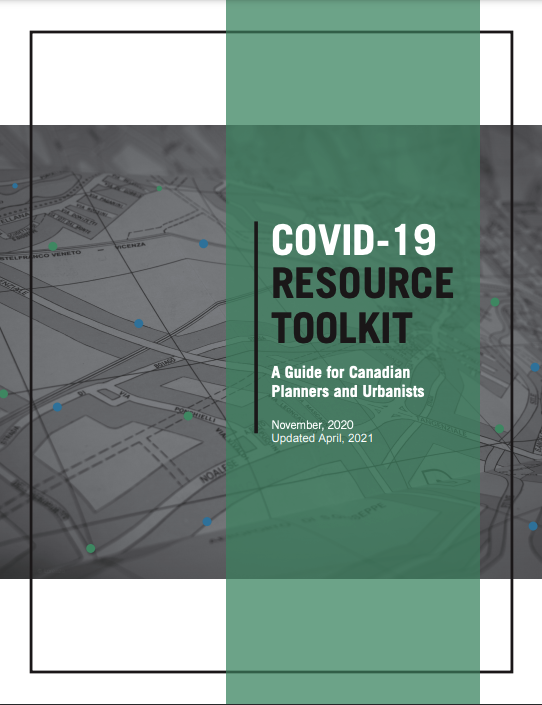2020 Annual Report
Aaniin, Boozhoo! Ullakut! Hello, Bonjour!
The Canadian Institute of Planners’ office is located on the unsurrendered territory of the Anishinaabe Algonquin Nation, whose presence on these lands reaches back to time immemorial. With a membership that spans Turtle Island, CIP values the ongoing stewardship of all First Nations, Inuit, and Métis, where we enjoy the opportunity to live, work, and study.
Letter From Our President, Dan Huang RPP, MCIP

As I reflect and write these words from my home in Victoria, BC, located on the traditional lands of the Lekwungen people, my soul is aching for the Tk’emlúps te Secwépemc Nation and for all who lost their lives in the residential school system. This is no longer just a page from our history books, but something we must confront as individuals and influencers in our communities in order to learn, heal, and chart a path forward together with Indigenous people and all Canadians across the nation. We owe it to the departed, the survivors, and to all future generations to face our truth, educate ourselves with open minds and hearts, and take meaningful steps towards true reconciliation and community building.
Following a quick pivot to a virtual AGM format in June 2020, we have all had to adjust our personal and professional lives throughout this entire full year of the pandemic. Meetings continued to be held (too many!), plans were developed, the public was consulted using new engagement tools, and projects were designed and constructed. In many ways, our work as planners continued to be “business as usual” and the pandemic actually became the catalyst for innovative pilot projects by promoting active transportation, outdoor gathering spaces, and enhanced enjoyment of natural areas. That said, while many of us believe virtual public hearings should become a permanent fixture in the planning process, I think that we can all agree that this past year has seen an increased level of anxiety and a diminished sense of connectivity and social cohesion, due to the lack of personal interactions that make communities what they are. I hope that you have all been able to take some time in each day to “find your centre” in order to stay grounded during these turbulent times.
I would like to take this time to especially thank all of our amazing CIP staff, led by our Chief Executive Officer, Beth McMahon. The team not only continues to keep the lights on (virtually), but works closely with the Board of Directors and our members with professionalism and tenacity, in order to keep our many CIP initiatives moving forward. Thank you to a great team!
I would also like to thank all of my colleagues on the CIP Board of Directors for your contributions this past year, especially to the four directors whose terms have expired – Doug Daniels, Josée Dion, Eleanor Mohammed, and Cindy Welsh. Special acknowledgment goes out to Eleanor, who served on the Board for six years, including as CIP President from 2016 to 2020. Eleanor’s leadership during these rebuilding years was instrumental in CIP’s renewal and revitalization, and she continues to grow our presence on the national and international stage. A warm welcome goes out to the incoming Directors; I look forward to meeting you in person soon, and to working with the refreshed Board on a number of important strategic initiatives.
As a final word of thanks, I would like to acknowledge all of the volunteers across the country who served in a variety of capacities, including, but not limited to: Committees (for CIP and allied professions), Professional Standards Board (PSC), Standards Committee (SC), College of Fellows (CoF), External Representatives, and the CIP/ICU Planning Student Trust Fund (CIP-PSTF). Without our many volunteers, we would not be able to achieve a fraction of our goals and objectives in raising the profile of our profession by providing our expertise on so many important topics impacting cities and regions across the country.
Although we were not able to gather together last summer in Whistler for the 2020 National Conference, CIP and PIBC jointly hosted the Elevation Webinar Series in November 2020. I was pleased to open the virtual event alongside PIBC President, Lesley Cabott, and welcome our keynote speaker, Chief Dana Tizya-Tramm, who provided an inspiring message from his home in Old Crow, YK, on the real and devastating impacts of climate change in his community and throughout the North. He closed his keynote with the following call to action: “If we can’t come together over this; if climate change can’t bring us together to fulfill the dreams of our ancestors, then we have no business being on this planet anymore.” CIP will continue to provide the leadership, tools, and resources to support our members in responding to the United Nation’s Decade of Action to deliver on the UN Sustainable Development Goals by 2030.
At the 2020 AGM, we introduced CIP’s Equity, Diversity and Inclusion (EDI) Roadmap, which identified the current state of EDI within the organization and its membership; defined the goals and desired target state for advancing the EDI agenda; and developed a 5-year plan to ensure a coordinated and effective approach. The Board of Directors is fully committed to implementing the EDI Roadmap, and during 2020, CIP undertook the following initiatives:
- EDI training sessions were organized for the CIP Board of Directors and staff of CIP and the Provincial and Territorial Institutes and Associations, with additional training scheduled for 2021;
- CIP staff all completed their Gender-Based Analysis (GBA+) training;
- Public (and free) webinar on EDI was delivered, with more public webinars planned;
- Policy and procedures review commenced to incorporate and strengthen EDI language;
- The EDI Insight Survey was planned and budgeted for 2021;
- EDI training sessions were organized for the CIP Board of Directors and staff of CIP and the Provincial and Territorial Institutes and Associations, with additional training scheduled for 2021;
- Institutional endorsement of the federal 50-30 Challenge to voluntarily commit to achieving meaningful and substantive improvements in supporting diversity and inclusion through gender parity (“50%”) and significant representation (“30%”) of other under-represented groups on the Board and in senior management.
Implementation of our EDI Roadmap is an intentional, methodical, but often an uneasy journey. Like our pathway towards Indigenous reconciliation, we will be confronting the past practices of our century-old planning traditions in Canada, and exploring our conscious and unconscious biases with the goal of providing tools and resources to help us all plan for more equitable, inclusive communities. Thank you to CIP staff, volunteer members, subject matter experts and knowledge-keepers who are helping us along this important journey.
Looking ahead, the Board will review and update CIP’s Strategic Plan, including our Vision, Mission, and Value Statements. The time is right to undertake this holistic review in light of the important discussions facing our profession highlighted above, namely Indigenous reconciliation, the climate emergency, and the EDI Roadmap. I look forward to completing the Strategic Plan by the end of 2021.
Thank you again to CIP staff, volunteers, and all members for your support of the Board and our Institute. As we turn the corner on this pandemic, to quote BC’s Provincial Health Officer, please continue to, “Be Kind, Be Calm, and Be Safe”. Take care, and we hope to see you in Whistler next July for the 2022 National Conference!
Respectfully Submitted,

Dan Huang RPP, MCIP President
Thank you to Eleanor Mohammed RPP, MCIP
President, 2016-2020
Serving as CIP President for over four years, Eleanor Mohammed RPP, MCIP, led and oversaw the transformation of the Institute. This included the development and implementation of new bylaws and Board structure (2016), the 2017-2020 “Our CIP” Strategic Plan (2017), three new national policies (2018), and the launch of the Equity, Diversity, and Inclusion Roadmap (2020). Eleanor’s conviction and commitment to the planning profession have left a lasting legacy for the organization and profession. Thank you Eleanor!
COVID-19
To say that 2020 was a difficult year, would be a gross understatement, with the pandemic impacting every person around the globe. CIP’s membership suffered job losses and experienced dramatic changes in their work responsibilities, in addition to managing and supporting the health and well-being of themselves and loved ones. The strain of the pandemic was captured in the CIP Membership Survey (December 2020), in which 64% of respondents reported a decline in mental health and well-being. Students and entry-level planners reported an accentuated effect: 74% of whom report a decline vs. 56% of executives and 47% of retirees. Now with vaccinations approved and in arms, there is a strong sense of cautious hope; however, the path to recovery will take significant time and deep empathy.
As society emerges from behind their masks, professional planners will have a critical role in shaping the future of public spaces and communities, ensuring that principles of equity, health, and sustainability are the forefront of recovery efforts. CIP will continue to share lessons learned from across the country and around the world, highlighting the considerable work and dedicated efforts of members and the profession.
The COVID-19 Resource Toolkit was released in November. It contains over 800 curated resources collected from March to October 2020, and includes academic articles, best-practices documents, news reports, podcasts, panel discussions, and more relating to the impacts of COVID-19 on the discipline of city-building. The guide was developed by three recent graduates of the Queen’s University School of Urban and Regional Planning: Adrian van Wyk, Elysia Ackroyd, and Leena Lamontagne-Dupuis, with assistance from Rachel MacKnight and Alicia Kunkel, and with the support of CIP.
Celebrating Our Volunteers
CIP’s accomplishments are a testament to its volunteers who ensure its governance, programs, and extensive networks are robust and effective. Thank you for your dedication and service!
Internal & External Bodies
CIP also recognizes its members who represent the Institute on external bodies:
| Organization | Representative(s) |
|---|---|
| National Competency Profile & Framework For The Planning Profession in Canada Project | Kristy Kilbourne, RPP, MCIP David Kriger RPP, MCIP Dr. Eric Rapaport RPP, MCIP Carla Stewart RPP, MCIP Mike Sullivan, RPP, MCIP |
| Central Experimental Farm Advisory Committee | Karen Sander and Rajbir Sian, RPP, MCIP |
| Commonwealth Association of Planners (CAP) | Kristin Agnello RPP, MCIP |
| Professional Standards Board For The Planning Profession in Canada | Greg Birch RPP, MCIP |
| CAP Young Planners Network Steering Group | Champa Maduranayagam RPP, MCIP |
| National Urban Design Awards Jury | Doug Leighton RPP, MCIP |
| Global Earthquake Model Canada – National Steering Committee | Laurent Mougeot |
| Standards Committee | Nina Maher RPP, MCIP |

What Our Members Say
According to the 2020 membership survey, the two most important CIP services for members are the MCIP® title and CIP’s advocacy on behalf of the profession, and Plan Canada magazine is the highest rated membership benefit.
MCIP®
MCIP® is a registered trademark of the Canadian Institute of Planners (CIP). Only individuals who have met all the professional requirements of their Provincial and Territorial Institute and Association (PTIA), and are members in good standing with their PTIA and CIP, are permitted to use MCIP in their professional title.
Plan Canada Magazine
Plan Canada is the premier planning magazine in Canada and the official magazine of the Canadian Institute of Planners. It is published quarterly and features informative and beautifully presented articles on innovative projects and best practices in Canadian planning, as well as original research by practitioners and academics. Each edition explores one theme in the planning world.
Social Media

Honours and Awards
CIP recognizes excellence across Canada through its Honours & Awards program, while its partner charity, CIP/ICU Planning Student Trust Fund, does so through its scholarships and bursaries offerings. These extraordinary planning achievements and planners highlight the best of our communities, organizations, and individuals at every career stage.
College of Fellows Inductees
The College of Fellows is a special status for members of CIP, which recognizes excellence, identifies prominent role models, promotes advancements in planning practice, and draws leaders to the forefront of planning in Canada. Recognition as a Fellow of the Canadian Institute of Planners is the highest award the Institute can give to a planner and is given only to those who exhibit the highest professional attainment and a wide breadth of experience.
In 2020, CIP welcomed Rafaël Fischler urbaniste, FCIP and Sasha Tsenkova RPP, FCIP into the College.

Honorary Member
Recognition as an Honorary Member of CIP is the highest honour the Institute can bestow upon a non-planner. This prestigious distinction recognizes individuals working outside of the planning profession who have made a significant contribution to promoting or enhancing planning practice, the profession, or both.
In 2020, CIP granted Honorary membership to the Honorable Michael F. Harcourt OC.
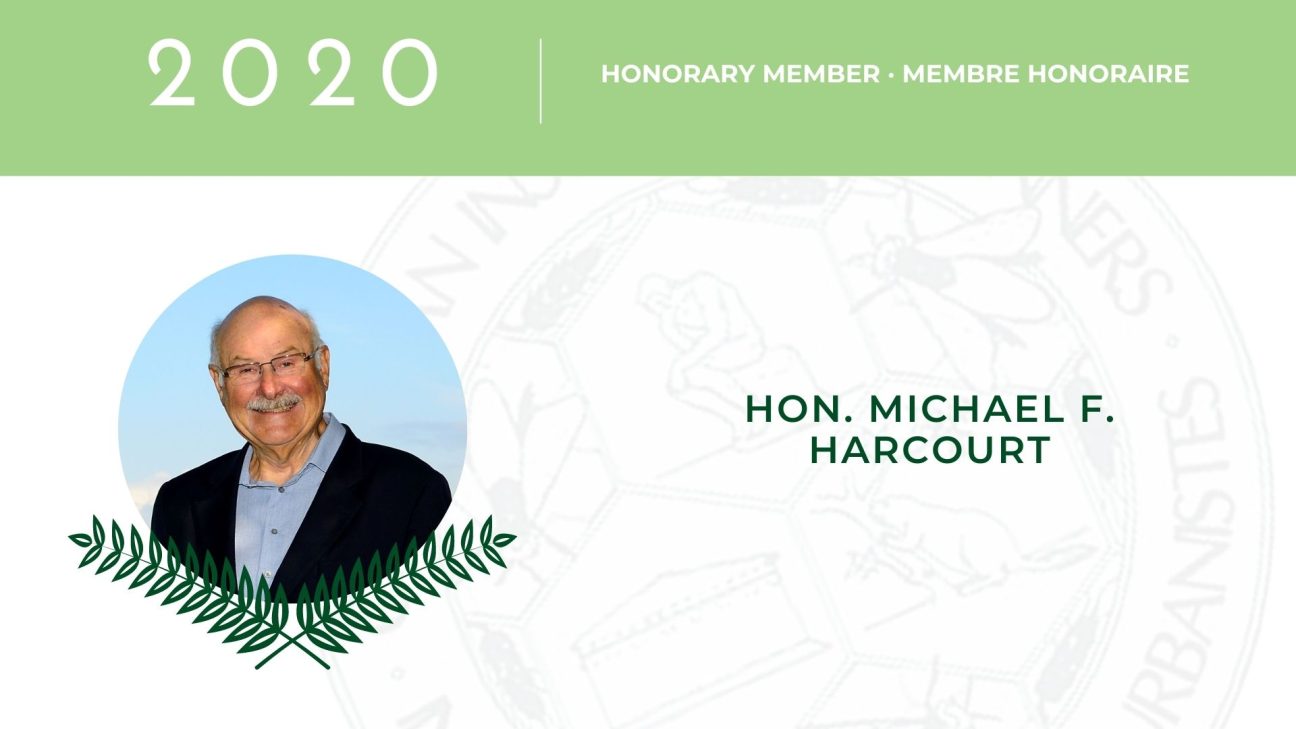
President’s Awards
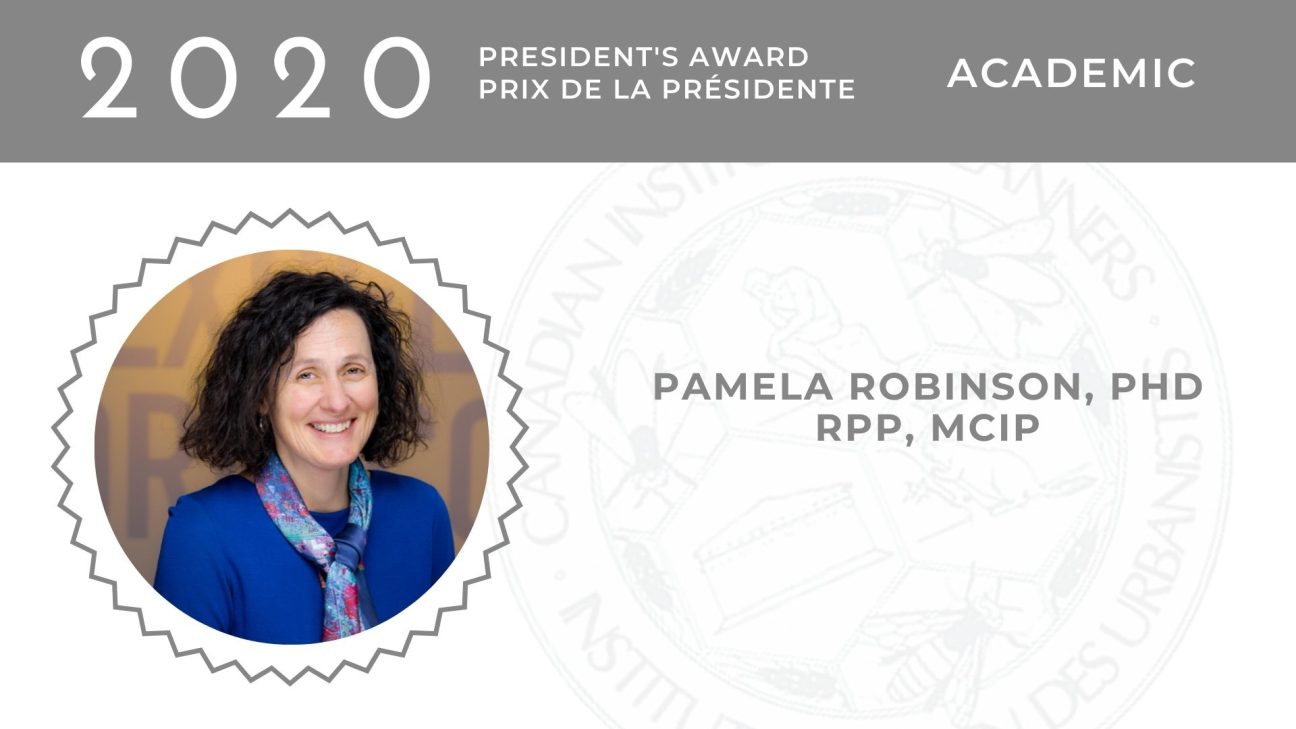
In 2020, CIP President’s Award: Academic recipient was Pamela Robinson, PhD, RPP, MCIP.
Created in 2019, this award was established to recognize outstanding achievement by a Canadian planning scholar whose significant contribution to planning research, literature, or the student community warrants acknowledgment on a national level. Recipients will demonstrate notable contributions that advance CIP’s stated values of Professionalism, Quality, Inclusiveness, Openness, Ethics, Transparency, Innovation and Collaboration. The award is given annually to an individual by the current CIP President.
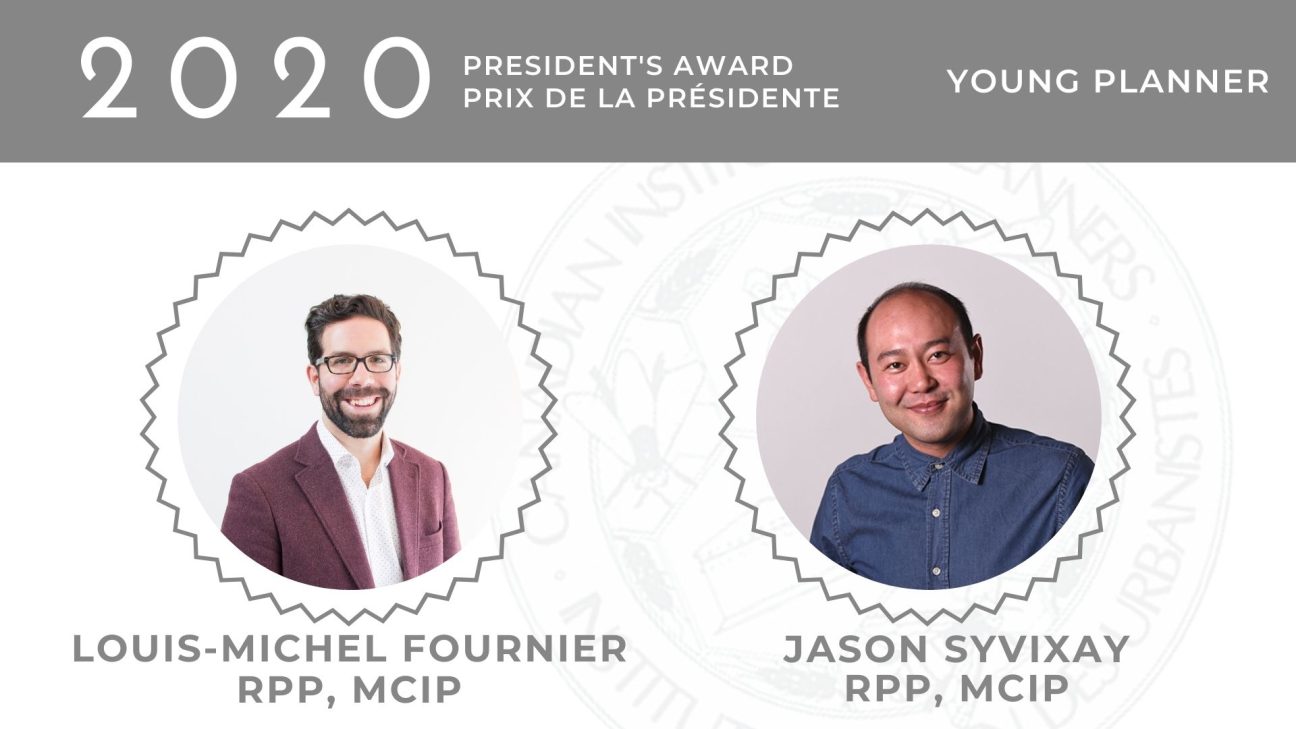
In 2020, CIP President’s Award: Young Planner recipients were Louis-Michel Fournier RPP, MCIP and Jason Syvixay RPP, MCIP.
In 2011, CIP created a second President’s Award to specifically celebrate the leaders of tomorrow. This award recognizes a young planner for vision, leadership, and/or service to the profession. The CIP President’s Award: Young Planner recognizes the outstanding professional success and achievement of a young Canadian planner under the age of 35. The award is given annually to an individual by the current CIP President.
The Presidentʼs Award: MCIP Recipient was created in 2019. This award was established to recognize outstanding achievement by a Canadian practicing planner (MCIP®) whose significant contribution to the planning community warrants acknowledgment on a national level. Recipients will demonstrate notable contributions in Canada, or abroad, that advance CIP’s stated values of Professionalism, Quality, Inclusiveness, Openness, Ethics, Transparency, Innovation, and Collaboration. The award is given annually to an individual by the current CIP President.
In 2020, CIP President’s Award: MCIP recipient was John Ariens RPP, MCIP.
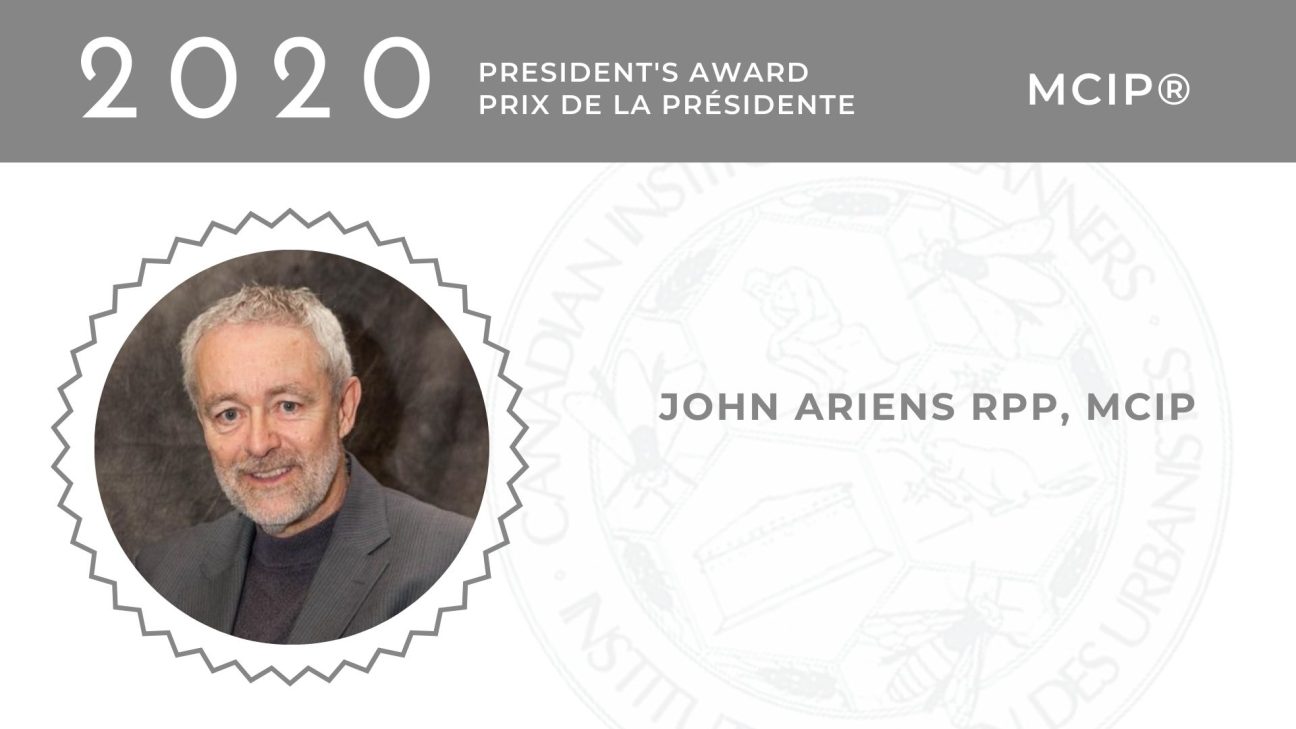
Academic Achievement Awards
21 graduate recipients each received a certificate and the book, Indigenous Relations: Insights, Tips & Suggestions to Make Reconciliation a Reality, by Bob Joseph.
- Kaelin Koufogiannakis, University of Alberta
- Andrew Lowerre, University of Alberta
- Matthew Goebel, University of Alberta
- Ms. Ryah Rondolo, University of British Columbia
- Dante Samson, Dalhousie University
- Alexander William DeFehr Glista, Dalhousie University
- William Louis Helps, University of Guelph
- Angelic Mojica, University of Manitoba
- Julia Tippett, University of Northern British Columbia
- Taylor Laplante, Ryerson University
- Brent Kuefler, Ryerson University
- Eva Doan-Lavoie, Université de Montréal
- Abigail Weger, University of Saskatchewan
- Richard Farthing Nichol, Simon Fraser University
- Andrew Tidswell, University of Toronto
- Margot Thomaidis, Vancouver Island University
- Peter Trifon Voltsinis, University of Waterloo
- Lauren Pettapiece, University of Waterloo
- Gaurang Khandelwal, University of Waterloo
- Vanessa Ong, University of Waterloo
- Jamilla Mohamud, York University
- Marianne Boivin, Université Laval
- Danielle Girard, McGill University
- Catherine Perras, Université de Montréal
Awards for Planning Excellence
A CIP Award for Planning Excellence is the highest honour a planning project can receive nationally. The Awards for Planning Excellence recognize planning projects judged on their excellence, innovation, impact on the profession, implementation potential, and overall presentation in 11 categories.
In 2020, there were seven Awards of Excellence and six Awards of Merit issued.
CIP invites you to read the jury statements and review the plans/reports in their entirety on the CIP website.
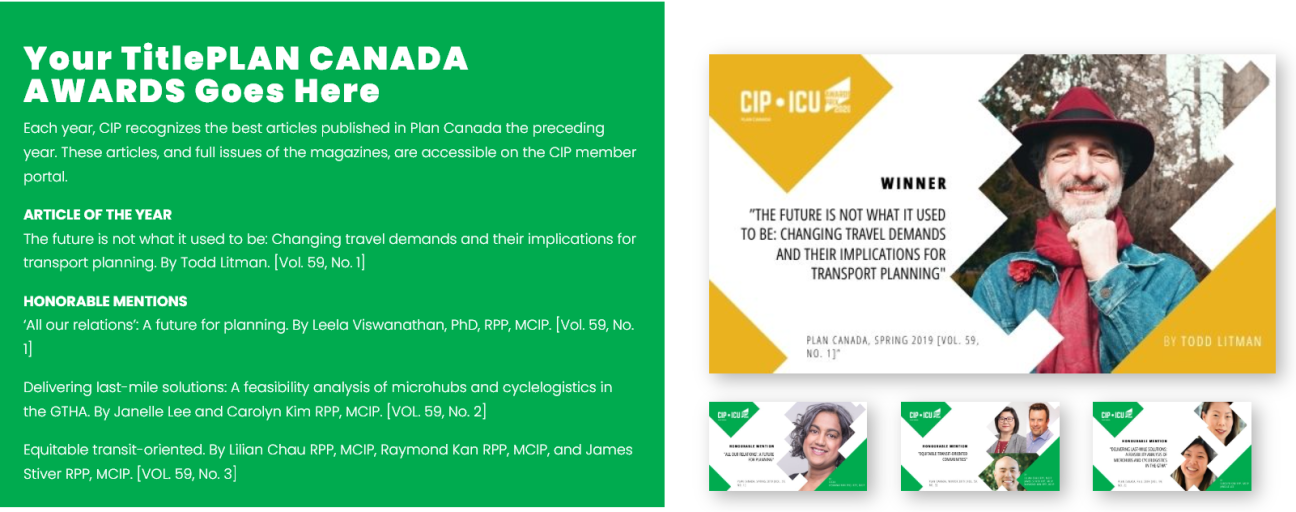
Congratulations to CIP’s New 2020 MCIPs
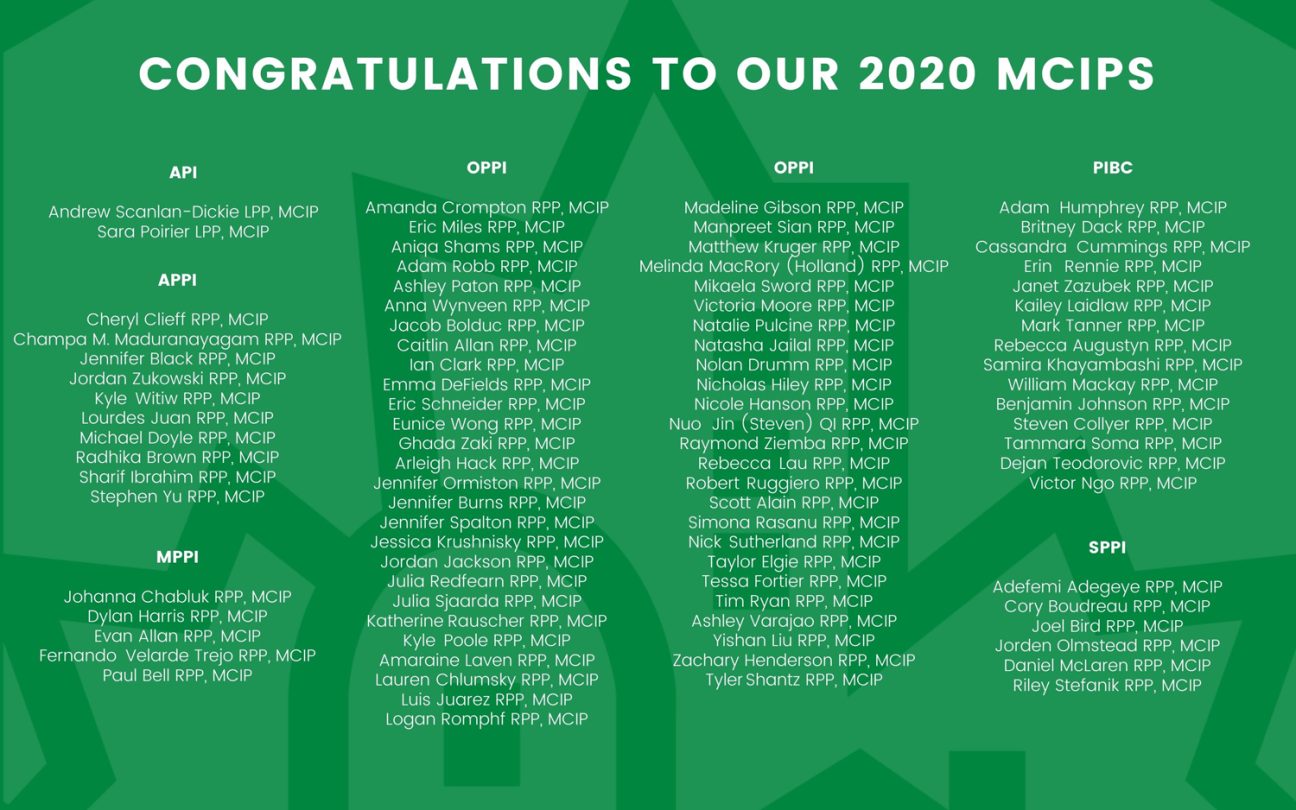
Thank you to the 2020 CIP Staff Team

